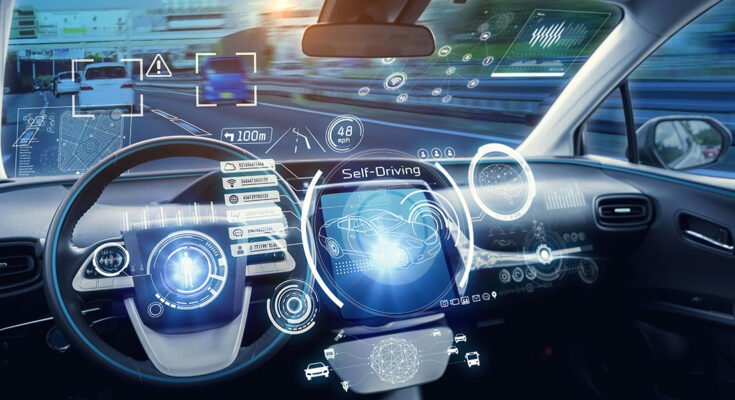Imagine a world where your car not only drives itself but does so while reducing your carbon footprint. A world where electric vehicles (EVs) are not just a greener alternative but are smarter and more efficient, thanks to artificial intelligence (AI). This is not a distant dream; it is the rapidly approaching future. In this blog post, we will explore how AI is revolutionizing the world of electric vehicles, making them smarter, safer, and more sustainable.
The Intersection of AI and Electric Vehicles
The union of AI and electric vehicles is more than a technological trend; it’s a revolution that promises to change the way we think about transportation. From autonomous driving capabilities to intelligent energy management, AI is transforming EVs into the epitome of futuristic mobility. This blog will take you through the current state of EV technology, the multifaceted role of AI, and the environmental impact, concluding with a glimpse into what the future holds.
The Current State of Electric Vehicles
Advancements in EV Technology
Electric vehicles have come a long way from their early prototypes. Today, they boast cutting-edge technology that offers high performance, longer range, and faster charging times. Companies like Tesla, Nissan, and Chevrolet have set benchmarks in the industry with groundbreaking models that compete head-to-head with traditional combustion engine vehicles. These advancements have not only made EVs more appealing but also more accessible to the average consumer.
Adoption Rates Worldwide
The global adoption of EVs is accelerating at an unprecedented rate. Countries like Norway, China, and Germany are leading the charge with substantial incentives and infrastructural support. According to the International Energy Agency (IEA), there were over 10 million electric cars on the road worldwide by the end of 2020. This number is expected to rise significantly in the coming years, driven by governmental policies aimed at reducing carbon emissions and promoting sustainable transport.
Challenges and Opportunities
Despite the rapid advancements, challenges such as limited charging infrastructure and higher upfront costs persist. However, these challenges present opportunities for innovation, with AI playing a crucial role in overcoming these hurdles. The integration of AI can optimize various aspects of EV technology, making them more efficient and user-friendly.
The Role of AI in Electric Vehicles
Autonomous Driving
Perhaps the most exciting application of AI in EVs is autonomous driving. Companies like Waymo and Tesla are at the forefront of developing self-driving cars that rely heavily on AI algorithms. These algorithms process vast amounts of data from sensors and cameras to make real-time driving decisions. The goal is to create a seamless and safe driving experience, reducing human error and accidents.
Energy Management
AI is also transforming how electric vehicles manage energy. Intelligent algorithms can predict energy consumption based on driving patterns, optimize battery usage, and even forecast the best times to charge. This ensures that the vehicle operates at peak efficiency, extending battery life and reducing energy costs. Companies like NIO and Rivian are already implementing such technologies in their latest models.
Safety Features
AI enhances EV safety through advanced driver-assistance systems (ADAS). These systems use machine learning to detect obstacles, monitor driver fatigue, and even predict potential collisions. By continuously learning from real-world data, AI systems can improve over time, offering enhanced safety features that traditional vehicles can’t match.
AI in EV Infrastructure
Smart Charging Stations
One of the significant hurdles in EV adoption is the availability and efficiency of charging stations. AI is revolutionizing this aspect by enabling smart charging stations. These stations can communicate with the vehicle to determine the optimal charging rate, reducing wait times and preventing grid overload. Companies like ChargePoint and EVBox are pioneering this technology, making EV charging more convenient than ever.
Predictive Maintenance
AI-powered predictive maintenance can foresee potential issues before they become critical. Sensors within the vehicle and charging stations collect data that AI algorithms analyze to predict component failures or maintenance needs. This proactive approach reduces downtime and maintenance costs, ensuring that both the vehicle and its charging infrastructure remain in optimal condition.
Grid Management
AI plays a crucial role in integrating EVs into the power grid. Intelligent algorithms can manage the load on the grid, especially during peak hours, by optimizing when and how EVs are charged. This not only prevents blackouts but also makes better use of renewable energy sources like solar and wind, contributing to a more sustainable energy ecosystem.
Environmental Impact
Reduced Carbon Emissions
One of the most significant benefits of AI-powered EVs is their potential to reduce carbon emissions. Traditional combustion engines are a major source of greenhouse gases, contributing to climate change. EVs, especially those powered by green energy, offer a cleaner alternative. AI optimizes energy consumption, further reducing the carbon footprint of these vehicles.
Energy Efficiency
AI enhances the energy efficiency of electric vehicles in multiple ways. From optimizing driving routes to managing battery usage, intelligent algorithms ensure that every joule of energy is used effectively. This increased efficiency not only extends the range of EVs but also reduces the overall demand for electricity, making it easier to integrate renewable energy sources.
Sustainable Manufacturing
AI is also making strides in the manufacturing process of EVs. Intelligent robotics and machine learning algorithms streamline production lines, reducing waste and energy consumption. Companies like Tesla are already leveraging AI to create more sustainable manufacturing processes, setting a precedent for the entire industry.
The Future Outlook
Innovations on the Horizon
The future of AI in the EV industry is brimming with possibilities. Emerging technologies like quantum computing and edge AI promise to take the capabilities of electric vehicles to the next level. Imagine EVs that can communicate with each other in real-time, share data, and make collective decisions for improved traffic management and safety.
Challenges Ahead
However, the road ahead is not without challenges. Issues like data privacy, cybersecurity, and ethical considerations need to be addressed. Ensuring that AI algorithms are transparent and unbiased is crucial for public trust and widespread adoption. Governments and industry leaders must collaborate to create regulations that safeguard these aspects while fostering innovation.
Opportunities for Growth
Despite the challenges, the opportunities for growth in the AI-powered EV sector are immense. Companies that invest in AI research and development are likely to gain a competitive edge. The integration of AI into the EV ecosystem can create new business models, from ride-sharing services to autonomous delivery fleets, opening up new revenue streams.
Conclusion
The integration of AI in electric vehicles is not just an upgrade; it’s a revolution that is set to change the future of transportation. From enhancing the functionality and safety of EVs to improving the charging infrastructure and reducing environmental impact, AI is proving to be a game-changer.
For tech enthusiasts, environmental advocates, and stakeholders in the automotive industry, the message is clear. The future of transportation is not just electric; it’s intelligent.
If you’re as excited about this revolution as we are, now is the time to get involved. Learn more about how AI and electric vehicles are shaping our future, and stay ahead of the curve.




